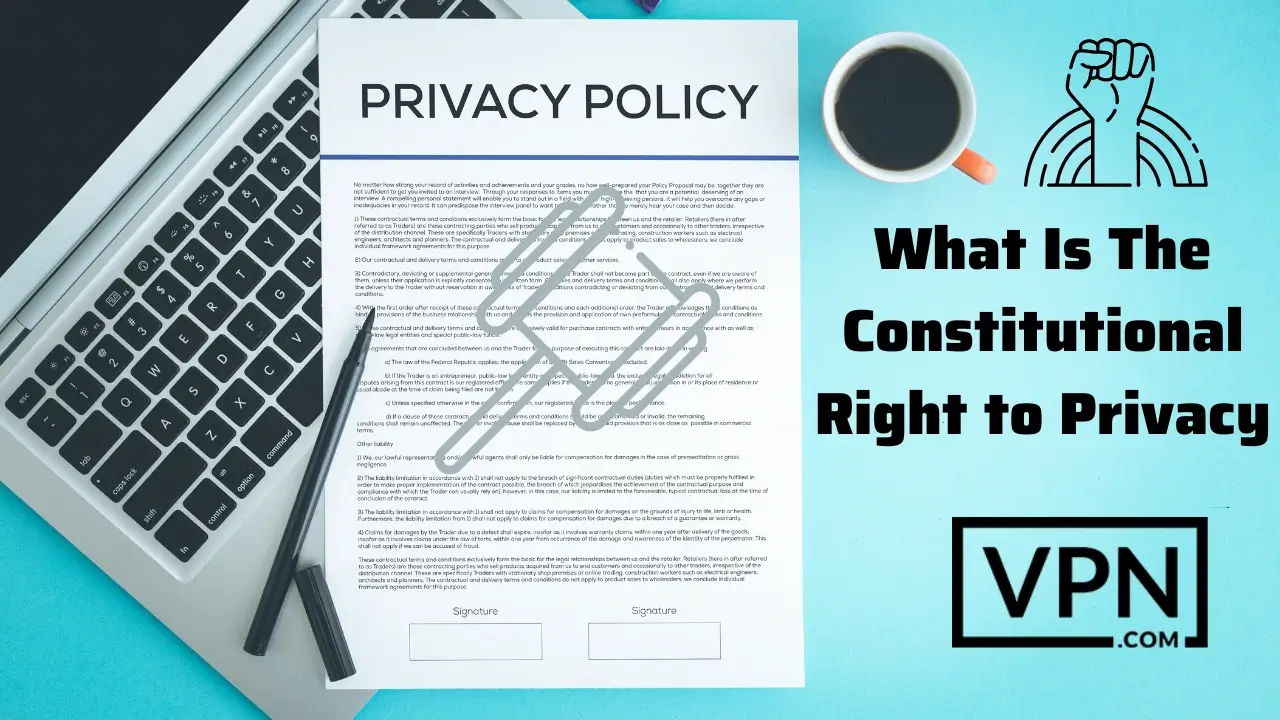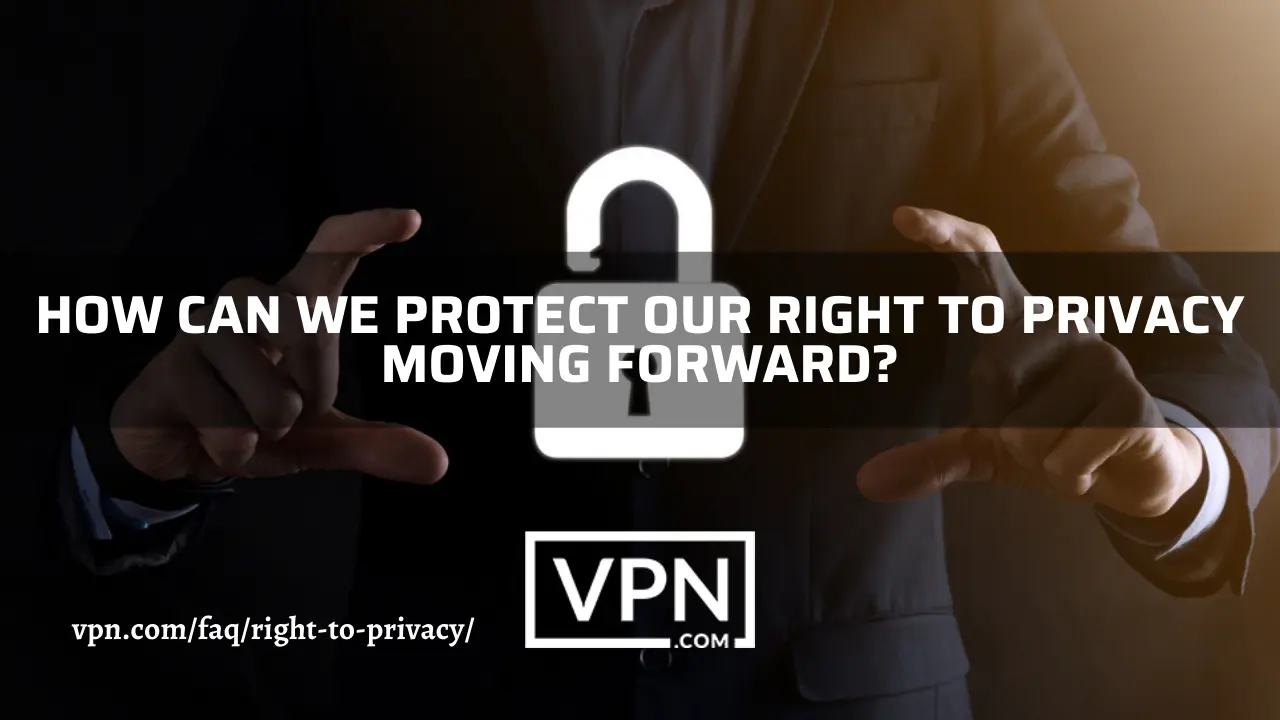The Constitutional Right To Privacy

Though it is not explicitly stated in the United States Constitution, the right to privacy is an inherent right that is often cited in court cases. This right protects individuals from government or other entities’ intrusion into their private lives. The history of the right to privacy dates back to the late 1800s, and several current issues threaten this right. In this article, we’ll explore the history and current state of privacy right in America.

Get Started w/ NordVPN
- Top-rated VPN for OS unknown
- Ultra-fast speed in US in 2024
- Save 60% off with VPN.com Discount
- Get a 30-day Money Back Guarantee
GUARANTEE
What Is The Right To Privacy?
The right to privacy is one of the most important human rights because it protects individuals from government or other organizations’ intrusion into their personal lives. This right allows individuals to keep certain aspects of their lives private and out of public view. The constitutional protections of privacy have been recognized by the Supreme Court on numerous occasions, and it has been entrenched in the United States Constitution’s Fourth Amendment.
Despite its constitutional protections, the liberty to privacy is under attack today from several sources. Government agencies are seeking to expand their surveillance capabilities, and businesses are collecting ever-more sensitive data about their customers. Additionally, social media platforms and other online services are tracking users’ activities and using this data for commercial purposes.
It is more important than ever to protect the right to privacy. We must be vigilant in safeguarding our personal information and data, and stand up for our right to keep our lives private.
History Of The Right To Privacy
The right to privacy is a fundamental human right that has been recognized for centuries. The first mention of the privacy right was in the English Bill of Rights in 1689, which stated that “the right of the people to be secure in their persons, houses, papers, and effects, against unreasonable searches and seizures, shall not be violated.“
However, it wasn’t until the late 1800s that the privacy right began to be recognized as a constitutional right. In 1890, an article in Harvard Law Review called “The Right To Privacy” argued that the Constitution protects the liberty to privacy. This article helped to lay the groundwork for future court cases that would expand on privacy right.
One of the most important court cases involving liberty to privacy was Griswold v. Connecticut. This case dealt with a state law that made it illegal for couples to use contraception. The Supreme Court struck down this law, arguing that the privacy right includes the right to use contraception.
The right to privacy has also been used to strike down laws that would ban same-sex relationships. In 2003, the Supreme Court ruled in Lawrence v. Texas that a state law criminalizing sodomy was unconstitutional. The court argued that the right to privacy protects the right to engage in intimate relationships, regardless of the sexual orientation of those involved.
Today, the liberty to privacy is under threat from several sources. One of the biggest threats is government surveillance. The National Security Agency’s mass surveillance program, which was exposed by Edward Snowden in 2013, is a prime example of how the government can intrude on our privacy.
Another threat to the privacy right comes from companies that collect our data. Many companies collect personal data without our knowledge or consent. They then use this data for marketing purposes or sell it to other companies. This type of data collection can have a major impact on our privacy rights.
Lastly, new technologies are also threatening privacy right. For example, facial recognition technology can be used to track our movements and identify us without our consent. Similarly, DNA testing can be used to collect sensitive information about our health and genetic makeup.
Protecting the liberty of privacy is essential to safeguarding our fundamental human rights. We must be vigilant in our fight to protect this right from those who would seek to violate it.

Get Started w/ NordVPN
- Top-rated VPN for OS unknown
- Ultra-fast speed in US in 2024
- Save 60% off with VPN.com Discount
- Get a 30-day Money Back Guarantee
GUARANTEE
How Right To Privacy Has Been Challenged In Recent Years?
In recent years, the right to privacy has been challenged in several ways. One of the biggest threats to this right is the rise of digital technology and the way it has changed how we live our lives. With cameras and microphones in nearly every device, and with our data being stored on servers all over the world, it has become increasingly difficult to keep anything private. In addition, the U.S. government has been increasingly collecting data about its citizens, through programs like the NSA’s Prism program. This data is then used to track our movements and monitor our activities.
Another challenge to the right to privacy comes from corporations. With companies like Google and Facebook tracking our online behavior and selling that information to third parties, it has become difficult to keep our personal lives private. In addition, many companies are now using data mining techniques to gather as much information about us as possible. This information is then used for marketing purposes or to sell products and services to us.
Finally, there is the issue of surveillance. With the rise of drone technology, it is now possible for the government to monitor our activities from the sky. In addition, facial recognition software is becoming more sophisticated and can be used to identify individuals in a crowd. This means that we are being watched all the time, and our privacy is constantly being invaded.
All of these threats to our liberty to privacy are very real and very serious. However, there are things that we can do to protect our privacy. We can use encryption to make it harder for others to spy on our communications. We can also be more careful about the information we share online and with whom we share it. And we can demand that the government and corporations respect our right to privacy.
Most Common Ways That The Right To Privacy Is Violated
The right to privacy is a basic human right that must be safeguarded at all costs. This right allows individuals to keep certain aspects of their lives private and free from government or other entity intrusion. However, there are many ways in which the privacy right can be violated.
One of the most common ways that the privacy right is violated is through electronic surveillance. The government or another entity can track an individual’s phone calls, emails, or website visits. Another common way that the privacy right is violated is through data mining. This involves collecting large amounts of personal data about individuals and then analyzing it for trends or patterns. This data can then be used to target individuals for advertising or other purposes.
Another way that privacy can be violated is through the use of biometrics. This involves using physical or behavioral characteristics to identify individuals. For example, fingerprints or iris scans can be used to identify individuals. This information can then be used for identity theft or other malicious purposes.
The privacy right is under constant threat from both government and private entities. Individuals need to be aware of how their privacy can be violated and take steps to protect themselves. One way to do this is to encrypt their data or use other security measures to make it more difficult for others to access their personal information. Another way to protect the right to privacy is by supporting organizations that are fighting for stronger privacy rights. Also, check out People ask questions about how to protect your privacy online?
How Can We Protect Our Right To Privacy Moving Forward?
1) Use encrypted messaging apps and email services.
2) Be aware of what information you share online.
3) Use a VPN when accessing the internet.
4) Delete your cookies and browsing history regularly.
5) Be careful about what you post on social media.
6) Opt out of data tracking when possible.
7) Use a secure password manager.
8) Avoid using public Wi-Fi whenever possible.
9) Keep your software and anti-virus programs up to date.
10) Educate yourself and others about the importance of privacy rights.
By taking these precautions, we can help protect our right to privacy in the digital age. However, it is also important to stay informed about the current threats to this right and to advocate for stronger privacy protections at the individual and governmental levels. Only by working together can we hope to keep our privacy safe from those who would seek to violate it.

Get Started w/ NordVPN
- Top-rated VPN for OS unknown
- Ultra-fast speed in US in 2024
- Save 60% off with VPN.com Discount
- Get a 30-day Money Back Guarantee
GUARANTEE
Conclusion
These technologies are becoming more common as we live longer lives with fewer children per family unit. We all need to learn how these tools work so we can protect ourselves against them when necessary by knowing what they do and where they’re being used. For example, if you notice an unfamiliar car parked outside your home or workplace late at night, it may be worth calling law enforcement about this potentially suspicious activity rather than using technology yourself because you don’t want unknown people (or robots) tracking your movements.
The bottom line is that we all have a constitutional right to privacy, and we should do everything we can to protect it. With the help of the privacy right amendment, we can make sure that our government and businesses respect this right and don’t use their power to infringe on our liberties. Thanks for reading!
Customer Reviews for NordVPN: In-Depth Review, Tests, and Stats

Connection issues with MLB.TV
May, 2 2023

Prompt customer service
May, 6 2023

I would highly recommend
December, 15 2023








